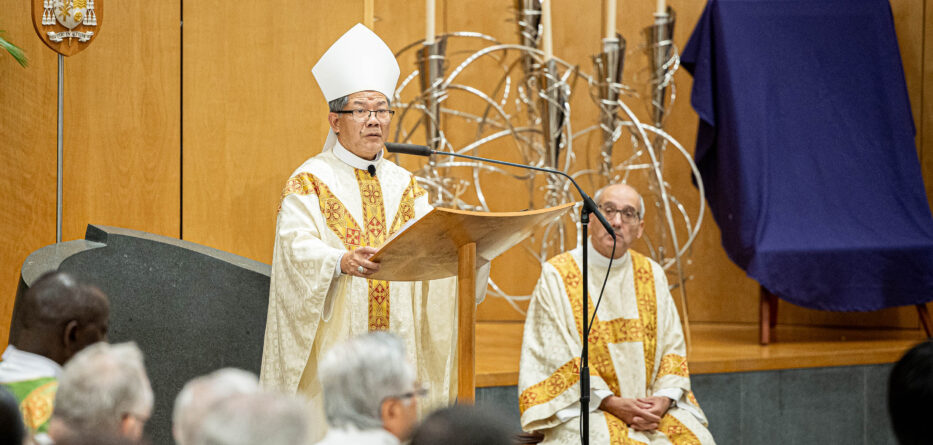2024 Chrism Mass – The Church that is the living Body of Christ for the world
Readings: Isaiah 61:1-9; Apocalypse 1:5-8; Luke 4:16-21
Dear friends,
Once again, we gather to celebrate the annual Chrism Mass, which commits us to be the vehicle of God’s love, healing, outreach and reconciliation for the world. It is reminder to us that we exist as the living Body of Christ to heal wounds, to warm hearts and to offer closeness especially to those who suffer. We are not an inward-looking group that is only preoccupied with what goes on inside the walls of the church. Our primary mission is to serve and to share the Good News even with the rising number of people who are estranged from institutional religions.
The tradition of the Chrism Mass in our diocese has always been oriented to the whole People of God and not to the clergy alone. We are conscious that the work of evangelisation belongs to all the baptised. This gathering is expressive of the synodal church in which the clergy, members of consecrated life and all the lay faithful are united with the chief shepherd of the diocese. Together, we commit ourselves to the on-going task of deep listening, discerning and aligning with the voice and the direction of the Holy Spirit for us in this time and in this place.
Pope Francis has been unambiguous about where the Church should be headed. The path of synodality, he maintains, is what God expects of us in the third millennium. The Church as the whole People of God, should walk together, sharing the burdens of humanity, listening to the cry of the poor and the cry of the earth, and bringing about the Kingdom vision of Jesus. Through the local synod which has reached a critical phase, we are endeavouring to develop a pastoral plan, including cultural and structural reforms that enable greater communion, participation and mission the whole People of God.
The Word of God this evening speaks of purposeful discernment and critical action in times of change and chaos. We must have the courage find new fresh ways of being Church that reflect authentically the person and message of Jesus and empower the people of our culture and time with fresh hope.
This was what the prophet Isaiah did during one of the most unsettling times in Israel’s history. The exiled Jews were given a dose of encouragement and optimism through a messianic prophecy. Isaiah made known God’s intent to revitalise the chosen people out of their impoverishment, powerlessness and despair. The Anointed of God would bring honour to the dishonoured; a garland instead of ashes and oil of gladness instead of mourning. He would heal the broken-hearted, comfort the sorowful and free the captives. The revitalisation project is not synonymous with a restoration of a bygone era of political and military dominance under David and Solomon. That period of Israel’s monarchy ironically saw the gradual fragmentation of the covenant community. Rather, the revitalisation project had more to do with Israel living out its vocation as a beacon of justice for the nations.
This is a sobering and poignant lesson for the Church today, too. We have much to learn from our ancestors in faith. The Church is first and fore most a presence, an oasis of hope and Good News. We must learn to be once again the Church that binds up broken hearts, proclaims freedom to captives and comforts all those who mourn. Equally, we must unlearn the old way that is steeped in clerical ostentation, pomp and triumphalism.
In the Gospel, Jesus takes up the message of Isaiah and turns it into a kind of personal manifesto. The blind see, the deaf hear, the lame walk, the dead raised and Good News preached to the poor constitute the signs of God’s reign. Wherever Jesus goes, people experience its in-breaking power through his person, teachings and actions. He fulfils the messianic prophecy of old and makes present the divine intent of redemption and reconciliation.
Dear brothers in the presbyterate,
The priesthood in the era of synodality entails a significant degree of vulnerability. The onus is on us to serve not as a lone heroic figure with a messiah complex but in relationship with one another and the community entrusted to our care. If the priesthood has a better future, it has to be humanised; it has to find expression in collaboration, mutuality and partnership. We must learn to discover a deeper and more holistic identity as members of the People of God and as presbyters in the sense of preceding and walking with fellow disciples.
Tonight, we consecrate the sacred oils, which will be used for the ministry to those in need. In this way, we enact God’s intent to heal, restore, strengthen and transform their lives. As priestly people, we are sent to consecrate and shape the world in accordance with the divine mandate. We cannot live our consecration fully, especially as ordained ministers, without getting ourselves immersed in the messiness of life, without going out and embracing those at the periphery. Our consecration pushes out into the deep. Let us commit ourselves to be the Church that strengthens the weak, heals the broken-hearted, lifts up the fallen and invites all to the communion of love.








